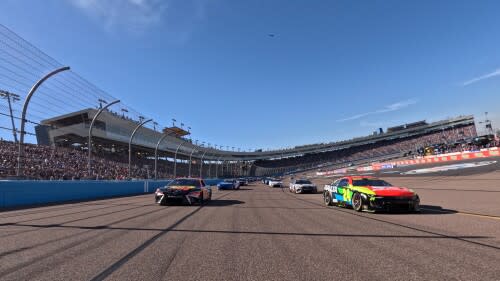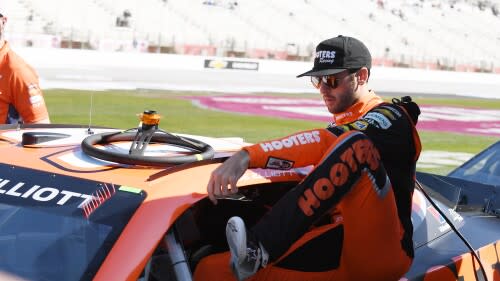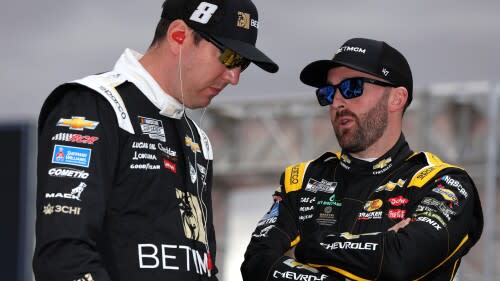Friday 5: NASCAR's 'Cinderella story' features hard work over pixie dust
A racing career that started in suburban Phoenix found its foothold not in Daytona or Indianapolis but in Lodi, California.
There, between San Francisco and the Sierra Nevada mountains, 13-year-old Michael McDowell moved into an apartment with his 16-year-old brother, Billy.
They took profits from their go-kart business to help Michael in his quest to someday race in the Indianapolis 500.
To reach that goal meant sacrifices. When Michael won, they often sold his kart to promote their business. When he won again, they sold that kart as well. And on it went. The brothers also worked on karts for others, including those that Michael raced against.
“If you want it bad enough and you chase your dream hard enough, you’ll figure out a way,” Michael McDowell told NBC Sports. “That’s what we did.”
His journey exemplifies how perseverance can be rewarded. In a NASCAR career where he often was with underfunded teams, Michael McDowell has found a home at Front Row Motorsports and helped that organization grow. While he never competed in the Indianapolis 500, Michael went on to win the 2021 Daytona 500 and last year’s road course race at Indianapolis Motor Speedway.
“It’s the Cinderella story from where you start to where you finish, overcoming all the adversity,” Billy McDowell told NBC Sports.
NASCAR Cup, Xfinity weekend schedule at Phoenix Raceway
Craftsman Truck Series teams will not race at Phoenix until November.
It’s a journey that started at the Phoenix Kart Racing Association’s 7/10-mile road course in Glendale, Arizona. The track is about 30 miles from Phoenix Raceway, site of Sunday’s Cup race — which will mark Michael McDowell’s 469th career series start. He’s scheduled to make his 500th career Cup start at Martinsville in November, a week before the series returns to Phoenix for the championship finale.
Both McDowell brothers got started in BMX bicycle racing. One day, Billy, now 42 and living in Phoenix, had a friend in the third grade racing karts. The family went to watch Billy's friend. Michael soon wanted to race a go-kart. He started at age 8.
As Michel progressed, the costs increased and the family couldn’t support much more.
So, Billy started a business preparing karts for other drivers.
“Creativity is what it was, but it came out of necessity,” he said.
The business grew. Billy said they had a 40-foot storage container for the business “that took up the entire backyard.” The race trailer was in front of the house.
“We’d come home from school and we’d be out there prepping go-karts and getting ready,” Billy said. “We planted a deal with a manufacturer that was an importer for chassis out of Italy.”
Phoenix race provides hope for NASCAR Cup drivers with winless streaks
The 1-mile Arizona track hosts two national NASCAR series this weekend.
By the time Billy was 14 (and Michael 11), the karting business moved into a 4000-square foot retail facility. It housed a chassis dyno. Engines were built out of their shop and the brothers helped prep 30 karts.
“It just took off to a point where we had so many customers and we were taking care of so many customers’ stuff that it just kind of grew organically,” said Michael, who turns 40 in December.
They were so busy working on karts that Michael switched to homeschooling at age 13. Their parents allowed Billy to move to Northern California at age 15 because karting was more prevalent there and business would increase.
“I was the cheap labor,” Michael joked. “I worked my guts out. (Billy) did as well, but he was the brains behind all that. I just worked hard. I took care of all the customer stuff and built the new karts and … and he worked the business side of it.”
As they did, Michael continued to win and move through the karting ranks. He won the 1997 World Karting Association 100 cc Jr. National Championship. He won International Kart Federation titles. He was the first American junior driver to podium in a North American event.
Good news, bad news for NASCAR Cup teams heading to Phoenix
A look at each of the Cup teams and what they have to feel good about and need to work more on.
Michael moved from karting to Formula Renault in 2002, which led to a scholarship to race in the Star Mazda Series in 2003 and 2004. That was a program that led to IndyCar racing.
While he ran two Champ Car races in 2005, Michael turned to the Grand Am Series before working his way to stock cars in 2006 and making his NASCAR debut in 2007 in both the Xfinity and Truck Series. He made his first Cup start in 2008.
Without the karting business, McDowell’s career might have stopped well short of what he’s accomplished.
“I can think of a lot of great moments and highlights and cool things, but what I think about more than anything is … how I am today is because of that time,” Michael said of his karting days and working with his brother.
“You just learned to figure it out. You learn to not take no as an option. You learn to just keep fighting and figure out a new way … and how to make things work because I’ve had to utilize that skillset every step of the way.”
2. Bouncing back
It’s easy to forget just how hard an impact drivers can experience in crashes when one sees them routinely exit the car after an accident.
Ryan Blaney provided a recent reminder when he said his impact during his qualifying race last month at Daytona registered a 55G spike and that his crash last August there had a 70G spike.
The numbers reveal only so much. Noah Gragson failed to finish five of 21 races last season due to an accident or damage from an incident and missed a race because of concussion-like symptoms.
Asked what it was like to experience accidents in a short time period, Gragson said: “You’re physically in pain. … Week after week you’re just digging yourself in a hole and you’re trying to do everything right and you land Sunday night after (a race) and you’re like, ‘OK, let’s regroup. Let’s go back to the racetrack and rebuild our confidence.’ And if you wreck again it’s like it just wears on you week in and week out, and then mentally you start just getting down about yourself.”
Gragson praises NASCAR's safety innovations that have allowed drivers to walk away from crashes but also said more can be done. It’s a sentiment NASCAR has stated in that the focus on safety is never finished.
“I appreciate NASCAR’s effort to make it safer, which they have over the past two years from when this car was introduced, but they still hurt way worse than any wreck I ever had before the Next Gen car,” Gragson said.
Gragson has avoided the big hits this year. He has two top-10 finishes in the first three races of the season to lead Stewart-Haas Racing. He placed sixth last weekend at Las Vegas.
Had it not been for a 35-point penalty to his team for a violation with the roof rails at Atlanta, Gragson would be 19th in points instead of 34th heading into Sunday’s race at Phoenix Raceway (3:30 p.m. ET on Fox).
“There is a little extra confidence in the tank leading into Phoenix, but, at the same time, you’re only as good as your last run, so once we get on track at Phoenix the Vegas run doesn’t really matter,” Gragson said.
“ … We’ve been working hard this week to get in position to run good at Phoenix, hopefully, but we just want to become better and learn throughout practice. It’s still very early in the season, and I think our expectations are pretty realistic. We want to finish better than we start, and we want to improve all day.”
3. Preparing for November
Much will be made this weekend about how well teams do since Phoenix Raceway will host the championship race Nov. 10. This year will mark the fifth consecutive year that the title race will be at Phoenix.
This has not been a good track for Toyota. Since the season finale moved to Phoenix in 2020, Toyota has not won the Cup title. Chase Elliott won the 2020 crown for Chevrolet. Kyle Larson claimed the 2021 title for Chevrolet. Ford has won the past two titles with Joey Logano in 2022 and Ryan Blaney in 2023.
“It’s completely unacceptable that we have yet to win a championship at Phoenix,” said David Wilson, president of Toyota Racing Development, in January.
He went on to say that “the buck stops here. It stops with our team partners. Bottom line, we haven’t got the job done.”
Last fall, the top Toyota in the season finale was Martin Truex Jr., who finished sixth. Toyota drivers combined to lead 15 of 312 laps — the first time in four races at Phoenix in the Next Gen era that a Toyota had led any laps.
Wilson acknowledged how Team Penske and Ford have won the past two championships even though Fords have the fewest wins the past two seasons. Chevrolet has won 37 of 72 races the past two years. Toyota has 18 wins. Ford has 17 wins.
Wilson said in January that “our focus is Phoenix … and races like Richmond and the ones that are closest to Phoenix because that is our championship.”
Four of the top six finishers in the spring race at Phoenix went on to race for the championship there last November. William Byron won the spring race. Blaney was second, Larson was fourth and Christopher Bell placed sixth.
4. More changes for Kyle Busch’s team
Kyle Busch will have a new pit crew for the third time in the first four races.
The pit crew roster for the Richard Childress Racing team has three new members listed for Sunday’s race at Phoenix Raceway.
The team has two new tire changers and a new jackman listed for Phoenix. Shiloh Windsor is listed as the new front tire changer in place of Michael Russell. The new rear tire changer is listed as Michael Johnson. He’s in place of Chris Jackson.
Doug Warrick is listed as the jackman, marking the third different person at that position since the Daytona 500. Josh Sobecki served as the jackman for the Daytona 500. Garrett Crall served as the jackman the past two races.
Last week at Phoenix, Busch entered pit road in second place at Lap 158, but a 17.016-second stop, according to Racing Insights, dropped him outside the top 15. Another 17-second stop at Lap 210 dropped him outside the top 30. He finished 26th.
The finish dropped Busch from the points lead to sixth.
5. Too fast on pit road
There have been 21 pit road speeding penalties called in the first three races of the season. There were 16 such penalties in the first three races of last season.
The increase is due Atlanta being in the first three races last year when it wasn’t a year ago. There were 14 speeding penalties there last month.
Daniel Hemric and BJ McLeod are tied with the most speeding penalties this season with three each. Christopher Bell, Ross Chastain and Josh Berry each has two speeding penalties this season.
Speeding could again be an issue this weekend at Phoenix. There were 10 speeding penalties in the race there last March. There were seven speeding penalties there in last year’s season finale. Kyle Busch was the only driver to have a speeding penalty in both Phoenix races last year.



